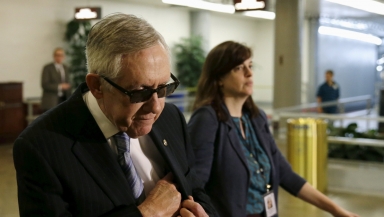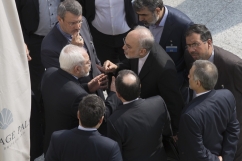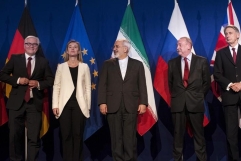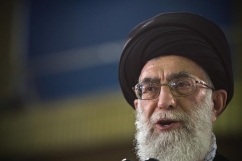
US President Barack Obama conceded on Tuesday that Congress will have the power to review a nuclear deal with Iran, reluctantly giving in to pressure from Republicans and some in his own party after they crafted a rare compromise demanding a say.
The role for the Republican-controlled Congress injects a new element of uncertainty into the delicate final stages of negotiations between major powers and Iran aimed at curbing Tehran's nuclear programme in exchange for sanctions relief.
Since a preliminary agreement was reached in Switzerland on April 2, the White House had stepped up its lobbying to persuade Democratic senators not to support the bipartisan bill that would give Congress oversight of a final deal, saying it could threaten what Obama hopes will be a legacy-defining foreign-policy achievement.
Washington, as well as negotiators from Iran and other members of the six-power group, has for months voiced concern that Congress could fatally undermine a deal before a June 30 deadline for a final pact.
Senate Foreign Relations Committee Chairman Senator Bob Corker, who wrote the bill, said the White House had agreed to go along with the bill only after it was clear there was strong Democratic support. The legislation was passed unanimously by the committee and is expected to pass the full Senate and then the House of Representatives.
"That change occurred only when they saw how many senators were going to vote for this," Corker said.

Bipartisan support for the bill had grown in recent weeks to near the 67 votes needed to override any presidential veto. But senators from Obama's Democratic Party did succeed in adding amendments to water down the bill, making it more palatable to the White House.
The bill that passed cut to 30 days from 60 the time in which Congress can review any final nuclear agreement and eliminated the requirement that Obama certify that Iran is not supporting acts of terrorism against the United States.
Instead, it requires the administration to send Congress regular, detailed reports on a range of issues including Iran's support for terrorism, ballistic missiles and nuclear programme.
It requires the Obama administration to send the text of a final agreement to Congress as soon as it is completed, and blocks Obama's ability to waive many US sanctions on Iran while Congress reviews the deal. It allows a final vote on whether to lift sanctions imposed by Congress in exchange for Iran dismantling its nuclear capabilities.
White House spokesman Josh Earnest said Obama, who had said in recent days he would veto the proposed bill, could accept the compromises that drew bipartisan Senate support.
"What we have made clear to Democrats and Republicans in the Senate Foreign Relations Committee is that the president would be willing to sign the proposed compromise that is working its way through the committee," Earnest said.
United Nations sanctions and those imposed by other countries could still be lifted if an agreement is reached on restricting Iran's nuclear programme by a June 30 target date.
But the prospect of Congress delaying sanctions relief or rejecting it altogether would add to concerns in Iran, whose Supreme Leader Ayatollah Ali Khamenei has demanded that sanctions be lifted immediately after a deal is signed.
European officials have said that worries about a possible spoiler role for Congress have undermined the US delegation's credibility in the talks and raised questions about the Obama's administration's ability to deliver on commitments.
OBAMA'S POLITICAL CAPITAL
Obama has invested enormous political capital throughout his presidency in securing an international agreement to ensure Iran does not develop a nuclear weapon, relying on tight sanctions that crippled Iran's economy and forced it to negotiate.
Earnest told reporters Obama had also insisted that there should be bipartisan agreement that this would be the only legislation governing Congress's oversight of the Iran deal.
Some Republicans, and a few hawkish Democrats, have pushed additional sanctions to put even more pressure on Iran but those bills were put on hold while the Corker bill moved forward.
Iran says its nuclear programme is for peaceful purposes and not to develop weapons capability, as many in the West fear.
Russia on Monday introduced a new wrinkle into the convoluted international wrangling around the nuclear talks by lifting a self-imposed ban on delivering its S-300 missile defence system to Tehran.
The move did not formally violate international sanctions, and the US State Department said the administration did not believe it would disrupt the unity at the talks, but Secretary of State John Kerry raised concerns with Moscow.
The full Senate is expected to vote on the bill shortly. Lawmakers will have the chance to offer additional amendments before that vote, but the White House said it would veto the bill if it were changed.
Obama's strongest Democratic supporters said they would fight any effort to make the bill more restrictive.
"If this bill is altered in ways that threaten this once-in- a-lifetime opportunity, to deal with a looming crisis, I will use every tool at my disposal to stop that from happening," said Senator Barbara Boxer.

















